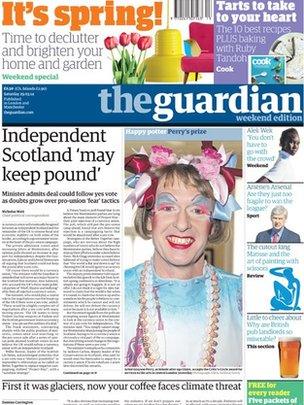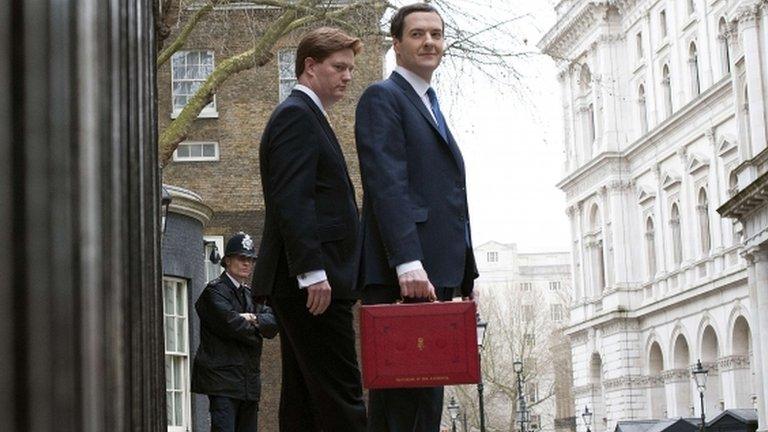Scottish independence: Contest of doubt and reassurance
- Published

The Guardian story says there could be a deal to allow Scotland to use the pound
Does it matter that an unnamed minister of unknown status follows an undiscernible motivation and gives an off-the-record comment to The Guardian? Frankly, yes it does.
Remember that this is a referendum, not an election. It is not about competing policies, it is about rivalry in trust. It is, as it has been from the outset, a contest of doubt and reassurance.
Mostly, it has been about the supporters of the Union casting doubts over the prospect of independence, with the Scottish Government, the SNP and others seeking to rebut these.
This controversy allows the supporters of independence to throw a doubt in the direction of Better Together, to question and challenge the certainty that the supporters of Union seek to create around the issue of currency.
Context matters. For months, the Chancellor and others described the prospect of a post independence sterling union as "highly unlikely" or "highly improbable".
It became evident that this warning was not sufficiently stern to deter the voters in Scotland. That point was made very firmly by, among others, Alistair Darling, the former Labour Chancellor who heads Better Together.
Faslane base
The warning was duly strengthened - in tandem with a paper produced by the chief civil servant at the Treasury. Now, it was stated that a currency union was formally precluded by the Conservative Chancellor, by the Liberal Democrat Chief Secretary and by the Labour Shadow Chancellor. It was ruled out, it would not happen.
The Guardian quotes an unnamed minister as saying that, despite these conjoined statements, a currency union would happen in the event of independence. Said minister, we are informed, also suggested that a currency union might be traded for the retention of the nuclear submarine base at Faslane.
Cue rigorous rejection of this prospect by the Chancellor and others. Here at the Liberal Democrat conference in Aberdeen, the Chief Secretary Danny Alexander tells me that nobody with any proximity to decisions on these matters believes that a sterling union is remotely feasible. It will not happen, he insists.
Mr Alexander says the report gives him and others an opportunity to restate their determined opposition to currency union.
Stay unnamed
However, it also gives an opportunity to his rivals. An opportunity to say again that the supporters of Union are bluffing, an opportunity to restate their argument that the statement on currency is a campaign tactic rather than a fixed policy. Once again, it is a contest of credibility.
What about the Faslane connection? Could that be a bargaining counter? Not, I would suggest, with regard to retention. The removal of Trident is too iconic for the Nationalists and their independence allies to surrender.
But I have noted here before that perhaps Alex Salmond might be willing to prolong the life of the base while alternatives were examined, should he be in a position to offer such a bargain.
Remember, though, the line from the Chancellor and others. It will not happen. No deal on a currency. No deal. In response, supporters of independence point to the Guardian report and yell: "Bluff!".
As for the unnamed minister, better stay unnamed. Otherwise, there will be a queue of ministerial colleagues waiting to shake you warmly by the throat.
- Published29 March 2014
